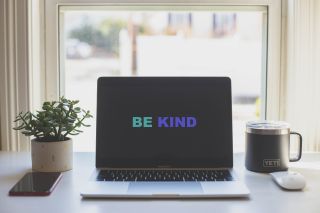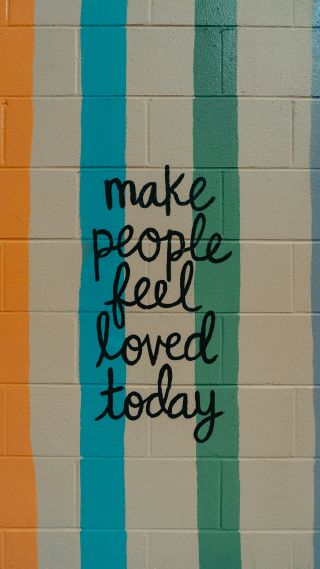Altruism
“Don’t Be a Sh*tty Person”
A plea from students trying to survive in today's world.
Updated November 27, 2023 Reviewed by Michelle Quirk
Key points
- Students are desperate for people to be better to each other.
- There are many psychological barriers to being good to others.
- Being nicer to others can be a big ask, but it’s certainly possible and, indeed, necessary.

Teaching a long lesson about self-harm the other day, I ended class by asking students to each give one action step that they felt could prevent suicide. The most popular: “Just don’t be a sh*tty person. Don't be sh*tty to other people.”
Students were so engaged in discussing the general, well, “not-nice-ness” of others that they willingly stayed 15 minutes after a 2-hour class to keep the conversation going. I was shocked. What entire class of incredibly busy students voluntarily stays 15 minutes after class ends to keep a discussion going themselves?
A class full of young people desperately trying to survive in today’s world, that’s who.
While I could easily lament the world “we” created for these students, leading them to absolutely plead for people to just be nicer, or at minimum less cruel, toward one another, it’s probably more helpful to look at some of the psychological factors here.
Is “just be nicer” really possible?
The System
Social psychologist Phillip Zimbardo, in his work on the psychology of evil, points out that, in psychology, when we study harmful behavior (“evil”) toward others, we often talk about it from individual and societal perspectives. What we leave out, he argues, are the systemic forces at play. We don’t acknowledge the system.
Sure, when people harm others, we can look at personality and we can look at things like social learning, but what about the systems, the structures, that we’ve built and put in place that foster such behavior? It’s easy, within capitalism, to identify systems that benefit from harm to others, but we just don’t tend to hold these systems, and ourselves, accountable for the harm they cause. Efforts to do so face enormous backlash.
Norms

The above gets to the idea of norms: often unspoken standards for behavior. In my extensive violence prevention career, we focused heavily on promoting positive and healthy norms. It wasn’t, and still isn’t, easy.
When, for example, someone is steeped in individualistic culture, the norm is to look out for one’s own self-interest, usually at all costs. Collectivistic culture, on the other hand, promotes norms around group and community well-being.
When violence is a means to achieving one’s self-interests in a culture that wholeheartedly promotes that, violence prevention work becomes an uphill battle, to say the least.
Altruism
When we’re asking people to be nicer to others, we’re often asking them to selflessly focus on the well-being of others. That’s altruism. Altruism involves helping others with no benefit, and despite any costs, to oneself. It’s a big ask in individualistic cultures.
Let that person merge into traffic in front of you. You’ll be 1.6 seconds later than if you didn’t.
Be nice to the parent with the screaming child. They need it and what, really, will it cost you?
Listen to that person’s story. It won’t kill you to provide support.
Scientists find that people are more likely to be altruistic to kin—those to whom they are biologically related. The explanation, from an evolutionary perspective, is that this helps us ensure that our own DNA continues to get passed on. Survival of the fittest, anyone? As one of my particularly clever students pointed out…isn’t that counter to the very idea of selflessness? Well, he has a point.
The fact is, we often do benefit from selfishness, so asking someone to help others, or just be nice to them, with no benefit to one’s self—and perhaps with potential cost—isn’t something we’re likely to do by default.
Self-Esteem
As anyone who works against or researches bullying will tell you, countless psychological theories point to the fact that, basically, we’re always trying to maintain and increase our own self-esteem. Well, guess what’s an easy way to do that? You got it—sh*t on other people, as my students would say.
Social comparison theory, for example, suggests that we look to others (compare ourselves) to inform our own self-evaluations. We can look upward, to those we deem as better, or we can look downward, to those we deem inferior. While social media certainly has us looking (supposedly) upward, guess which one theorists often propose we do more? Yep, thinking about and treating others as inferior makes us feel a lot better about ourselves.

Prosocial Behavior
So are we just wired to be mean? Are the individual, social, and systemic forces at play simply so strong that my students will never see the world they want, in which people are good to each other? After all, being “not terrible” to others seems an easy ask. As we’ve established, however, there are many barriers to that ask.
That being said, there is a substantial body of work around prosocial behavior—behavior meant to benefit others. These behaviors are more than “just not being mean” to others. These are intentional acts meant to contribute to the well-being of others. While such behavior may not be our default setting, research suggests that prosocial behaviors actually make us feel better about ourselves, contributing to a positive self-image. So maybe in this way, selfishness isn’t all bad?
We Can Do Better
We have to listen to my students here. We can’t afford not to.
Whomever we blame, the world is an objectively threatening place for them. Their pleas aren’t even for more of anything; they’re just begging for us to stop being…nasty…to others. If we can’t do that, then where are we headed? Our children deserve better, and it's time we give it to them.
If you or someone you know is contemplating suicide, seek help immediately. For help 24/7, dial 988 for the 988 Suicide & Crisis Lifeline, or reach out to the Crisis Text Line by texting TALK to 741741. To find a therapist near you, visit the Psychology Today Therapy Directory.




